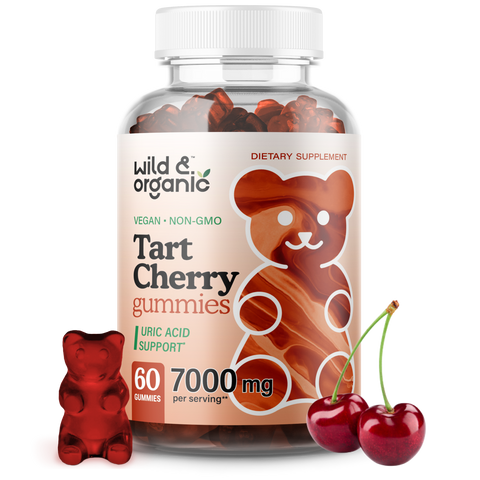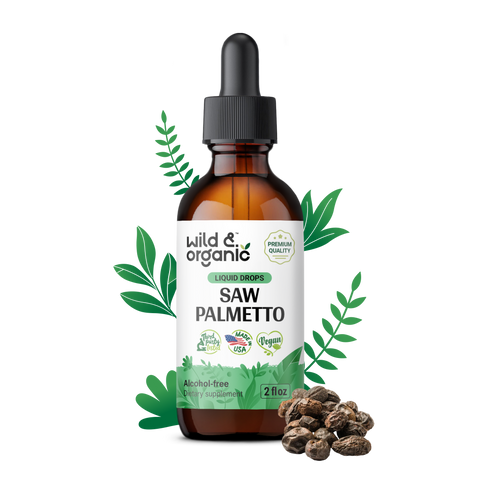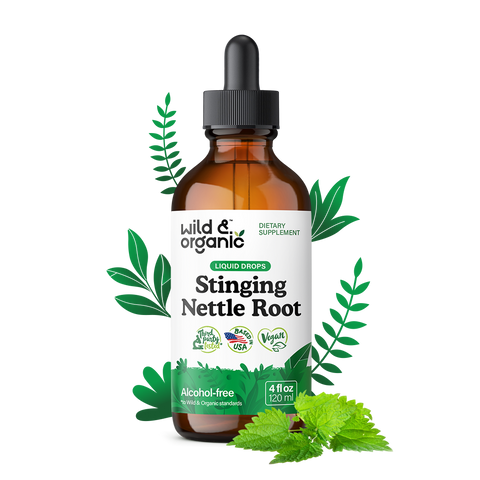Urinary health is a crucial aspect of overall well-being, significantly affecting millions of
Urinary health is a crucial aspect of overall well-being, significantly affecting millions of individuals worldwide. It encompasses a proper functioning urinary tract, ensuring effective removal of waste and toxins from the body. A healthy urinary system prevents discomfort and diseases such as urinary tract infections (UTIs), kidney stones and incontinence [1]. Furthermore, it also regulates blood pressure and maintains homeostasis.
The influence of diet on urinary health cannot be overstated. Nutritional choices play a pivotal role in how we maintain and support both men’s and women's urinary health. Did you know that the foods and beverages we consume can directly affect the acidity and volume of urine, the health of bladder walls and the risk of developing urinary tract issues [2]? As well as certain nutrients offer their beneficial properties, including antioxidant and diuretic effects. This article explores the best foods for urinary health support and what foods one should limit or avoid at all. We will also discuss the role of natural supplements in supporting urinary tract health and its efficiency. Dive into this 10 minute read to be better equipped with science-backed facts which can support your journey to better health and wellness!
How Diet Impacts Urinary Health
To start with, let’s discuss what urinary health issues individuals can encounter during their lives. Common urinary health issues include urinary tract infections (UTIs), which are particularly frequent in women [3]. Millions of people worldwide are struggling with kidney stones, otherwise known as nephrolithiasis, a painful condition caused by the crystallization of minerals and salts in the urine. Overactive bladder (OAB), which is characterized by urgent and frequent urination, is also frequent [4]. Furthermore, many experience interstitial cystitis, a chronic condition causing bladder pressure and pain. Prostate problems, such as benign prostatic hyperplasia (BPH) [5], also significantly affect urinary health in men, leading to difficulty in urination and bladder emptying.
These conditions significantly impact millions of lives globally. They not only cause considerable discomfort but also lead to a less active and fulfilling daily life. Given the significant discomfort and lifestyle limitations these urinary health issues can impose, it's crucial to explore effective strategies for prevention and management. Diet plays a foundational role not only in optimizing urinary health but also in supporting the functionality of other bodily systems and overall well-being. By focusing on dietary choices and hydration, individuals can take proactive steps toward minimizing the risk of urinary health problems and improving their quality of life
Discussing the Best Foods for Urinary Health Support
For optimal urinary function, incorporating specific foods and beverages into your diet can indeed play a significant role. These dietary choices can help maintain a healthy urinary tract, support the overall function of the kidneys and bladder.
Foods to Eat
- Cranberries and Blueberries: These fruits are known for their UTI-prevention properties due to compounds that prevent bacteria from adhering to the urinary tract walls [6].
- Watermelon and Cucumbers: Fruits and vegetables containing a high-water-content help flush out the urinary system and keep the bladder healthy [7].
- Pumpkin Seeds: Rich in omega-3 fatty acids, pumpkin seeds can help with bladder and prostate health [8], [9].
- Probiotics: The role of probiotics for urinary health lies in maintaining a healthy balance of bacteria in the urinary tract, reducing the risk of UTIs [10].
- Leafy Greens: Spinach, kale and chard are rich in antioxidants and minerals that support detoxification processes in the kidneys.
- Whole Grains: Foods like quinoa, barley and oats are high in fiber, which helps prevent constipation that can put pressure on the urinary tract [11].
- Garlic: With its natural antibacterial properties, garlic can help fight UTIs and support overall immune health [12].
Among healthy food for urinary health support, there's plenty of drinks that can benefit too. Here’s a list of beverages to consider:
Beverages to Drink
- Water: As the most crucial liquid for our body, water helps dilute urine and ensure regular flushing of the urinary tract.
- Cranberry Juice: The importance of cranberry for urinary health lies in preventing UTIs. Drinking pure cranberry juice (without added sugars) can make the urinary tract slippery and prevent bacteria from sticking [13].
- Herbal Teas: Certain herbal teas, like dandelion or parsley tea, have diuretic properties that promote kidney health and urine production [14].
- Green Tea: Rich in antioxidants, green tea supports overall health and can reduce the risk of kidney stones [15].
What Foods and Beverages to Avoid?
Maintaining optimal urinary health is not just about incorporating healthy foods and beverages into your diet. It is equally important to be mindful of what to limit or even avoid. Certain foods and drinks can irritate the urinary tract, exacerbate underlying conditions and increase the risk of urinary health issues.
Here's a look at the foods and beverages that are best avoided for optimal urinary health [16]:
Foods to Avoid
- Spicy Foods: Foods high in spices can irritate the bladder, worsening symptoms of conditions like interstitial cystitis or an overactive bladder.
- Acidic Foods: Citrus fruits, tomatoes and their derivatives can increase bladder irritation in sensitive individuals, leading to discomfort.
- High-Sodium Foods: Excessive salt intake can contribute to water retention, putting additional pressure on the kidneys and leading to high blood pressure, which affects kidney health.
- Chocolate: High in caffeine and sometimes sugar, chocolate can irritate the bladder and should be consumed in moderation, especially by those with sensitivity.
Beverages to Avoid
- Caffeinated Beverages: Excessive consumption of coffee, tea and some sodas can irritate the bladder and increase the frequency of urination. It can be troublesome for those with overactive bladder or interstitial cystitis [17].
- Alcoholic Drinks: Alcohol is a powerful diuretic that can lead to dehydration, and it may irritate the bladder, exacerbating urinary symptoms and conditions.
- Carbonated Beverages: Sodas and other carbonated drinks can irritate the bladder for some people, leading to increased symptoms of urgency and frequency.
- Artificially Sweetened Drinks: Beverages containing artificial sweeteners like aspartame or saccharin may irritate the urinary tract in some individuals
The Role of Natural Urinary Health Supplements
Various herbs and plants have garnered attention for their potential to support and enhance urinary health. They offer a more holistic and gentle approach to maintaining the urinary system's function. Various herbs for urinary health support are rich in anti-inflammatory, antibacterial and diuretic properties, making them beneficial to reduce related discomfort and promote overall health. Let’s explore the best supplements for urinary health and what benefits these natural wonders can offer!
Tart Cherry
One of the best urinary health supplements, tart cherry, is known for its vibrant color and sour taste, and is rich in antioxidants, including anthocyanins and flavonoids. These compounds not only combat inflammation but also play a crucial role in preventing urinary tract infections (UTIs) and supporting kidney function [18]. The anti-inflammatory properties of tart cherry can help alleviate symptoms associated with conditions like cystitis and overactive bladder, providing a natural and gentle relief [19].
The diuretic effect of tart cherry is another notable benefit [20]. It promotes the flushing out of toxins, bacteria and excess salts from the body, reducing the risk of kidney stones and UTIs. This effect also aids in maintaining healthy blood pressure levels [21]. This is crucial for kidney health, as high blood pressure can be a significant risk factor for renal diseases.
Moreover, the consumption of tart cherry can maintain a healthy balance of pH in the urine, preventing the urine from becoming too acidic [22]. It reduces the risk of UTIs and the formation of certain types of kidney stones, further emphasizing its role in promoting urinary tract health.

Stinging Nettle
Among herbs for urinary health support, stinging nettle is noted for its rich composition of vitamins, minerals and phytochemicals. This plant offers significant benefits, particularly for those dealing with benign prostatic hyperplasia (BPH), urinary tract infections (UTIs) and kidney-related issues [23].
For individuals experiencing BPH, a condition characterized by the enlargement of the prostate gland which affects urine flow, nettle helps reduce common symptoms. It works by inhibiting the conversion of testosterone into dihydrotestosterone, a process linked to prostate growth [24]. Consequently, this activity helps alleviate urinary frequency, difficulty in starting urination and the incomplete emptying of the bladder.
Beyond prostate health, stinging nettle's diuretic properties play a crucial role in urinary tract health. By naturally promoting the production of urine, stinging nettle aids in flushing out bacteria and toxins from the urinary system, reducing the risk and severity of UTIs [25]. This cleansing effect is beneficial for kidney health as well, as it helps in preventing the formation of kidney stones by ensuring regular and efficient elimination of waste products.

Wild & Organic Stinging Nettle Tincture - 2 fl.oz. Bottle
Saw Palmetto
Saw palmetto can become the best supplement for urinary health support in terms of BPH management [26]. The active components of this herb, including fatty acids and plant sterols, work synergistically to inhibit the enzyme 5-alpha-reductase. This enzyme converts testosterone into dihydrotestosterone (DHT), a hormone that contributes to prostate growth [27]. By reducing the production of DHT, saw palmetto can help reduce the symptoms of BPH, improving urinary flow and reducing the urgency and frequency of urination [28].
In addition to its benefits for BPH, saw palmetto has been studied for its potential to reduce inflammation of the urinary tract. Its anti-inflammatory properties may soothe the urinary tract, providing relief from symptoms associated with urinary tract infections and other urinary health issues [29], [30].
Moreover, saw palmetto can strengthen the bladder [31]. It enhances its ability to empty completely and reduces residual urine in the bladder, further supporting urinary health and reducing the risk of infections and bladder stones.

Wild & Organic Saw Palmetto Tincture - 2 fl.oz. Bottle
Final Thoughts
The foundation of our overall health and wellness is deeply rooted in our diet, and urinary health is no exception. Through a deeper understanding of what to eat and what to avoid, we can make informed dietary choices that have a profound long-term benefit on our urinary system. Nutrient-rich foods, adequate hydration and the mindful avoidance of irritants play a crucial role in maintaining the delicate balance of our urinary tract's health.
As we navigate through the myriad of dietary options available, the knowledge of how certain foods and beverages impact our urinary system empowers us to make choices that not only enhance our urinary health but also contribute to our overall well-being.
Why Buy Our Supplements for Urinary Tract Health?
In your quest for urinary health, turn to nature’s best offerings! Meticulously formulated from the purest, most effective ingredients, our supplements naturally support urinary tract health. Try now and discover how they promote long-term urinary wellness and aid in your comfort.
Resources:
- https://my.clevelandclinic.org/health/body/21197-urinary-system
- https://pubmed.ncbi.nlm.nih.gov/32441853/
- https://pmc.ncbi.nlm.nih.gov/articles/PMC3749018/
- https://my.clevelandclinic.org/health/diseases/14248-overactive-bladder
- https://my.clevelandclinic.org/health/diseases/9100-benign-prostatic-hyperplasia
- https://pubmed.ncbi.nlm.nih.gov/17492798/
- https://www.advancedurologyinstitute.com/8-easy-ways-cleanse-kidneys/
- www.medicalnewstoday.com/articles/pumpkin-seed-oil-for-overactive-bladder
- https://www.healthline.com/nutrition/11-benefits-of-pumpkin-seeds
- https://pmc.ncbi.nlm.nih.gov/articles/PMC8720415/
- https://www.healthline.com/nutrition/best-foods-for-constipation
- https://pmc.ncbi.nlm.nih.gov/articles/PMC4283390/
- https://pmc.ncbi.nlm.nih.gov/articles/PMC7025796/
- https://www.healthline.com/health/natural-diuretics
- https://pubmed.ncbi.nlm.nih.gov/16724910/
- https://www.healthline.com/health/11-foods-to-avoid-if-you-have-oab
- https://www.healthline.com/nutrition/diet-and-utis-foods-to-avoid-with-a-uti
- https://pmc.ncbi.nlm.nih.gov/articles/PMC10483724/
- https://www.healthline.com/nutrition/10-tart-cherry-juice-benefits
- https://pmc.ncbi.nlm.nih.gov/articles/PMC10559679/
- https://www.sciencedirect.com/science/article/pii/S1018364720300045
- https://www.healthline.com/health/how-to-reduce-uric-acid
- https://www.mountsinai.org/health-library/herb/stinging-nettle
- https://www.healthline.com/nutrition/stinging-nettle
- https://pmc.ncbi.nlm.nih.gov/articles/PMC9253158/
- https://pmc.ncbi.nlm.nih.gov/articles/PMC3326341/
- https://pmc.ncbi.nlm.nih.gov/articles/PMC6859144/
- https://www.webmd.com/men/prostate-enlargement-bph/supplement-guide-saw-palmetto
- https://www.mountsinai.org/health-library/herb/saw-palmetto
- https://pmc.ncbi.nlm.nih.gov/articles/PMC1476047/
- https://www.medicalnewstoday.com/articles/321911



